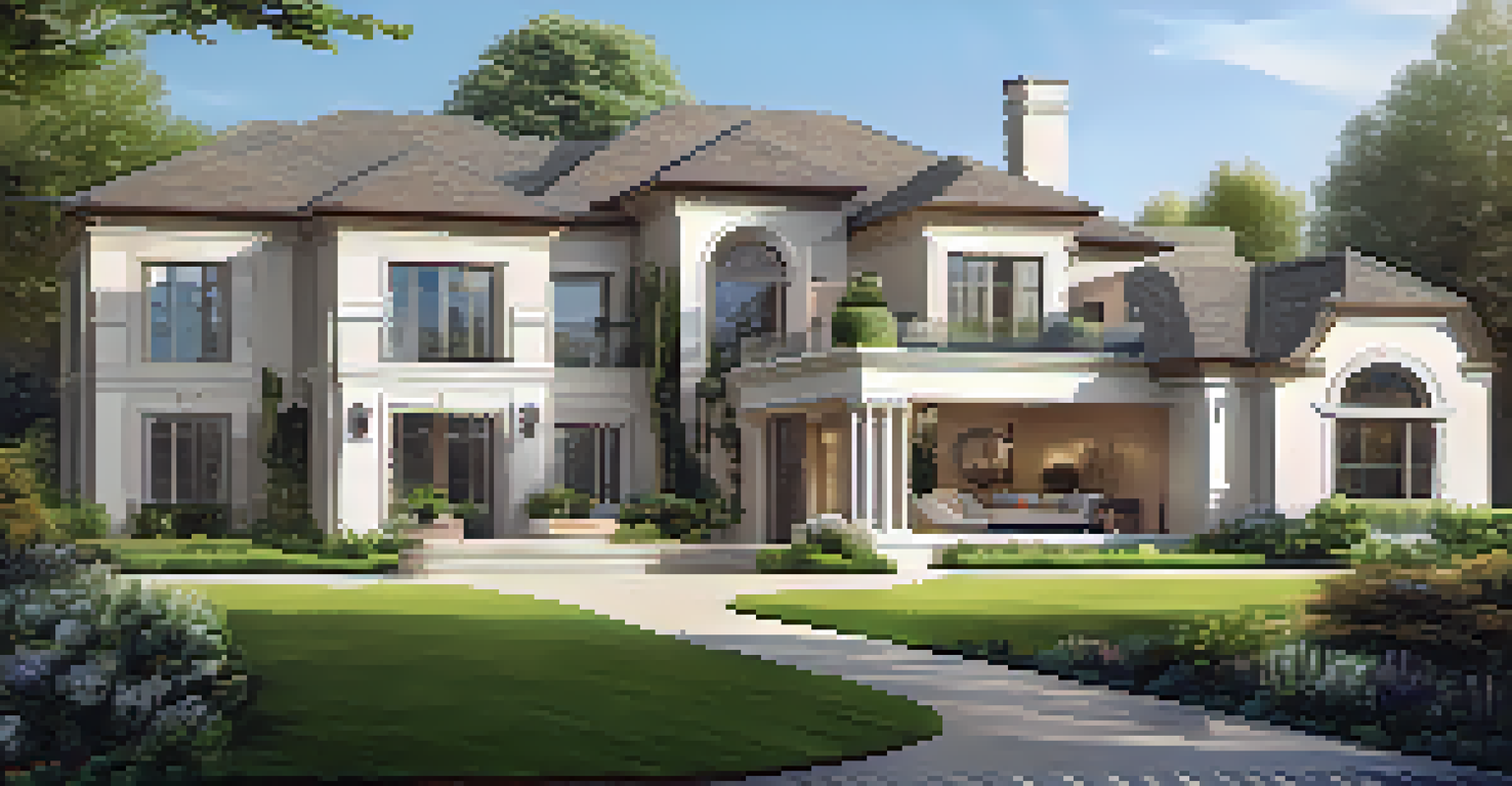The Influence of Economic Growth on Luxury Real Estate

Understanding Economic Growth and Its Indicators
Economic growth refers to the increase in the production of goods and services in a country over time. It is usually measured by the rise in Gross Domestic Product (GDP). When economies grow, indicators such as employment rates and consumer spending tend to improve, leading to greater confidence among residents.
Economic growth is not just about wealth; it's about ensuring that growth benefits everyone.
For instance, a booming tech sector in a city can lead to higher salaries, which increases disposable income. This newfound financial freedom allows individuals to consider purchasing luxury properties, which were previously out of reach. As a result, luxury markets often react positively to the economic climate.
Understanding these indicators helps real estate investors and buyers anticipate market trends. When economic growth is strong, luxury real estate typically sees increased demand, leading to higher prices and rapid sales.
The Relationship Between Economic Growth and Wealth Distribution
Economic growth does not benefit everyone equally; it often leads to wealth concentration. This means that as the economy expands, a smaller segment of the population may accumulate more wealth, while others see little change. This phenomenon can significantly affect the luxury real estate market.

For example, in cities where tech industries flourish, the influx of high-earning professionals can drive up demand for luxury housing. On the flip side, areas that do not experience similar economic growth may see stagnation in their luxury markets, as fewer affluent buyers are present.
Economic Growth Boosts Luxury Demand
As economies grow, the demand for luxury real estate increases due to higher disposable incomes and affluent buyers entering the market.
Thus, the relationship between economic growth and wealth distribution becomes crucial for luxury real estate. Investors need to recognize which demographics are benefiting from growth to make informed decisions on property investments.
Impact of Economic Growth on Luxury Real Estate Prices
As economic growth accelerates, luxury real estate prices often follow suit. Increased demand from affluent buyers typically leads to bidding wars, pushing prices even higher. This trend is especially evident in urban areas where economic activities are concentrated.
The luxury market is a reflection of economic conditions, and understanding these conditions is crucial for investors.
Take New York City, for example, where luxury apartment prices soared during the economic recovery following the 2008 financial crisis. The city's vibrant job market attracted high-income earners, who were willing to pay premium prices for desirable properties.
However, it's essential to note that this spike in prices can also create barriers for new buyers, limiting access to the luxury market. This dynamic can lead to a more competitive environment where only a select few can afford to enter.
Luxury Real Estate Investment Trends During Economic Growth
During periods of economic growth, investors often flock to luxury real estate as a stable asset. This trend is driven by the perception that luxury properties, particularly in prime locations, retain their value better than other investments. Investors view these properties as a hedge against inflation and economic downturns.
For instance, during the economic expansion of the 2010s, we saw a surge in high-net-worth individuals investing in luxury real estate in markets like Miami and Los Angeles. These areas were seen as safe havens, attracting both domestic and international buyers.
Wealth Distribution Affects Luxury Markets
Economic growth often leads to wealth concentration, impacting the luxury real estate market by creating disparities in demand across different regions.
This behavior highlights the importance of luxury real estate as a strategic investment. Investors must keep an eye on economic indicators to time their purchases effectively and maximize returns.
The Global Influence of Economic Growth on Luxury Markets
Economic growth is not just a local phenomenon; it has global implications for luxury real estate markets. As emerging economies like China and India experience rapid growth, their wealthy populations begin to seek luxury properties abroad. This international interest can drastically reshape local markets.
For example, the luxury real estate market in London has seen increased demand from Chinese buyers looking to invest in prestigious properties. This influx not only raises prices but also introduces a broader range of designs and styles influenced by different cultures.
This globalization of luxury real estate illustrates how interconnected the market has become. Understanding these global trends is vital for investors and real estate agents to adapt their strategies accordingly.
Challenges Faced by Luxury Real Estate Amid Economic Fluctuations
While economic growth brings opportunities, it also presents challenges for the luxury real estate market. Economic fluctuations can lead to uncertainty, causing potential buyers to hesitate. This caution can result in longer selling times and price corrections in the luxury sector.
For instance, during the COVID-19 pandemic, even high-end markets like Beverly Hills experienced a slowdown. Buyers became more risk-averse, which affected demand and led to price adjustments. This scenario reminds us that luxury real estate is not immune to broader economic conditions.
Global Trends Shape Luxury Investments
The interconnectedness of global economies influences local luxury markets, as wealthy buyers from emerging economies seek properties abroad.
Navigating these challenges requires adaptability and a keen understanding of market dynamics. Investors and developers must remain vigilant and responsive to changing economic landscapes to thrive in the luxury sector.
Future Outlook for Luxury Real Estate in Growing Economies
Looking ahead, the future of luxury real estate in growing economies appears promising. As more regions experience economic growth, the demand for luxury properties is likely to continue. This trend presents unique opportunities for developers and investors alike.
For instance, countries in Southeast Asia are witnessing rising affluence, leading to a surge in luxury real estate projects. Developers are increasingly focused on creating properties that cater to the tastes and preferences of affluent buyers in these emerging markets.

However, it's essential to approach this growth with caution. Understanding local markets and consumer preferences will be key to success in navigating the evolving landscape of luxury real estate.